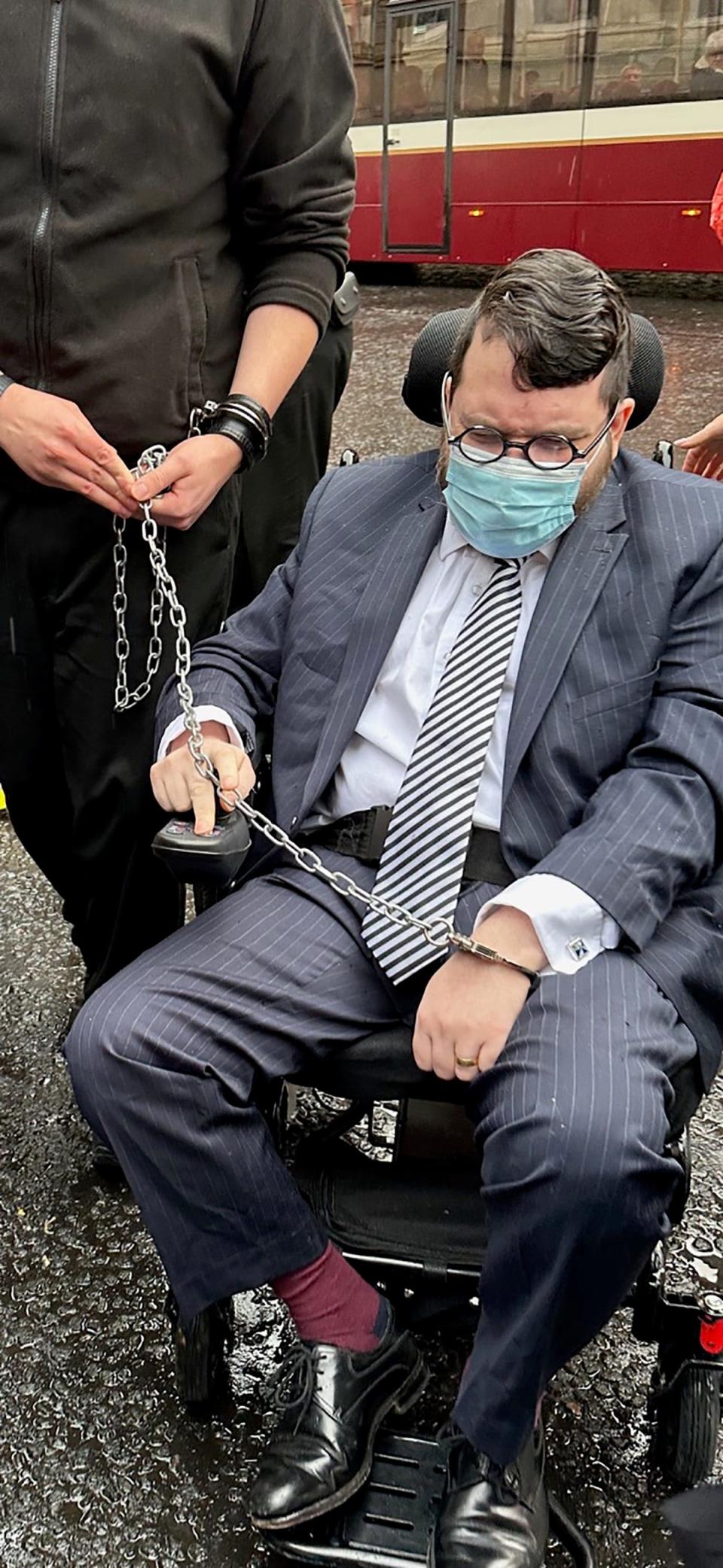American who faked his own death could return to US after bizarre trial ends in Scotland
After three days of extradition proceedings this week, a Scottish judge on Friday, to no one’s surprise, declared Nicholas Alahverdian to be Nicholas Alahverdian - an American who faked his own death and who spent the past 11 months claiming he was an Irishman named Knight.
It had taken 11 months since his overseas arrest to get to Friday's ruling; 11 months during which the former Rhode Islander, who faked his death in 2020, employed skills in deception, delay and defiance to test the constraints of a legal system based solidly on etiquette and parliamentary procedure.
He said again and again he was Arthur Knight, a former Irish orphan who moved to England as a boy, though he supplied no evidence to his claim except an Irish driver's license determined to be fake. On Friday morning, Extradition Court Sheriff Norman McFayden took minutes to release whatever little air might have remained in Alahverdian’s balloon.
Reading from his written judgment, McFayden said that the prosecution’s evidence of matched fingerprints, tattoos and earlier mug shots of Alahverdian (who was arrested several times a decade ago by Rhode Island police on domestic violence and other charges) was overwhelming.

McFadyen dismissed Alahverdian’s outlandish claim that some hospital staffer had taken his fingerprints surreptitiously while hospitalized with Covid and sent them to Utah so that a prosecutor there could frame “Arthur Knight” for Alahverdian’s crimes.
Alahverdian's saga: Is he a Utah rape suspect named Nick or an Englishman named Knight? UK court could help decide
Alahverdian on the stand: American disputes charges against him
Abuse, disguises, denial:Nick Alahverdian's act is all too familiar to his Ohio ex-wife
'Run toward the bliss of the sun'
An online obituary said Nicholas Alahverdian, of Rhode Island, died in 2020 surrounded by his family in a room "filled with the sounds of the end credits for the 1997 film 'Contact.'"
"His last words were 'fear not and run toward the bliss of the sun,'" the obituary read.
The announcement of his death at 32 came two months after he told local media he had late-stage non-Hodgkin lymphoma. Shortly after news of his death, tributes from politicians poured in for Alahverdian, an outspoken critic of of Rhode Island’s child care system.
Alahverdian, 35, was charged by Utah County Attorney David Leavitt's office in connection with a 2008 rape. At the time, Alahverdian went by the alias Nicholas Rossi.
"We don't we don't file charges against dead people," Leavitt said. "We charged him because we knew he was alive."
The DNA collected at the time of the sexual assault wasn’t tested until 2017 as part of an effort to clear backlogged rape kits. In 2018, the DNA evidence came back as a match to a sexual assault case in Ohio, where Alahverdian was convicted in 2008 on two sex-related charges.
The Utah investigation, authorities said, found similar complaints against Alahverdian in several states.
The FBI said Alahverdian is also wanted in Ohio on charges he obtained credit cards in his foster father’s name and amassed more than $200,000 in debts.
'Implausible and fanciful'
Referring to Alahverdian by his former surname Rossi, McFadyen said “I have no valid or coherent reason to doubt that the prints examined were those provided by the US authorities and that these are, as they assert, prints of Nicholas Rossi who is charged in their proceedings, and I reject Mr. Knight’s explanation as to how his prints came to be taken while he was in hospital … as implausible and fanciful.”
As McFadyen read his decision, Alahverdian showed no reaction and simply followed along reading a copy of the judgement from his wheelchair at the defense table.
On Tuesday Alahverdian took the stand in his own defense and had answers for all the evidence against him, as bizarre as they were.
He claimed someone had inked the very intricate and identifying tattoos on his arms while he had been in a Covid coma. And that his alternating Irish accent was caused by his use of a supplemental oxygen supply (though he didn't use any all week).
Alahverdian's attorney Mungo Bovey, had little to work with. During his closing statement, Bovey said he might call as a witness a former lawyer of Alahverdian's who would testify his client had no tattoos when he saw him in April. But Bovey dropped that idea after Sheriff McFadyen raised the obvious contradiction: his client claimed he did have tattoos — put involuntarily on his body while comatose.
During this week's hearing in Edinburgh, Alahverdian presented only one defense witness, his wife, Miranda, who he married in England in February 2020. It was the same month he staged his death back in Rhode Island, using some Rhode Island media outlets to report his issued statements of his death after weeks of seeding the idea of his imminent demise in phone conversations with reporters.
A Scottish prosecutor chose not to cross-examine Miranda in any confrontational way that could have put her in the position of committing perjury. Authorities say it remains unclear to what extent she herself may be a victim of her husband.
Alahverdian will now face a separate extradition hearing on whether he will be sent back to the United States. The process could take months. A preliminary hearing is scheduled for January.
More coverage for USA TODAY subscribers
Broken Adoptions: How one adoption agency’s demise gutted American families
America's reckoning: 82 schools have removed their racist namesakes since 2020. Dozens now honor people of color.
Having fridge problems?: Safety complaints surge, with most aimed at Samsung
Your health: Can common infections trigger lifelong health conditions? It's possible, new studies suggest
Neighbors fighting neighbors?: A 30-day minimum law for Airbnbs has Oahu homeowners split
Contact Tom Mooney at: tmooney@providencejournal.com; includes reporting from Amanda Pérez Pintado, aperezpintado@usatoday.com.
This article originally appeared on USA TODAY: Scottish judge rejects 'dead' American man's mistaken identity claim

